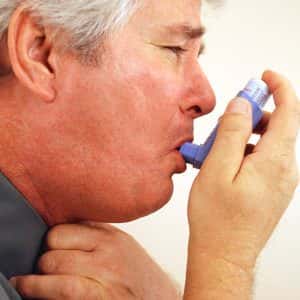
The standard treatment for asthma and COPD often involves inhaled corticosteroid drugs like beclomethasone (Qvar), budesonide (Pulmicort, Symbicort) and fluticasone (Advair, Flovent). One side effect that patients may not be warned about is hoarseness or laryngitis. We fear it is considered a minor complication of therapy. Ear, nose and throat specialists (otolaryngologists) recognize that it can be a serious problem for many patients. They even have a name for this condition. SIL, also known as Steroid Inhaler Laryngitis (JAMA Otolaryngology-Head & Neck Surgery, June, 2002) may be far more common than most other health professionals realize.
How Common is Steroid Inhaler Laryngitis (SIL)?
When you search the official prescribing information for an inhaled HFA drug like Advair (fluticasone plus salmeterol) you will discover that throat irritation is listed at around 7 to 9 percent. Hoarseness and dysphonia (difficulty speaking) is 1 to 3 percent. We suspect it is substantially higher.
That is not just our opinion. Here is a comment by Dr, John DelGaudio, an ENT-otolaryngologist in Atlanta, Georgia affiliated with Emory University Hospital:
“The Physicians’ Desk Reference reports the incidence of hoarseness for the various steroid inhaler preparations to range from 1% to 9%, compared with 0 to 3% for nonsteroid inhalers. Clinical studies show the incidence of hoarseness to be much higher, occurring in as many as 55% of patients who use steroid inhalers. Of the inhaled steroids, fluticasone has a greater topical potency and greater tissue retention and half-life. Clinical reports of the incidence of dysphonia with fluticasone are limited, and clinical studies report an incidence that ranges from only 2% to 6%…
“The physical changes that are seen in the larynx of patients using inhaled fluticasone range from minimal to severe. Mild physical findings include edema [swelling] and erythema [redness]. Moderate changes include mucosal thickening and vocal cord bowing. The most dramatic changes include leukoplakia [thickened white patches], granulation, and laryngeal candidiasis [yeast infection].”
What Is It Like to Have Steroid Inhaler Laryngitis?
Q. I work as a public address announcer, so my voice is essential for my job. My asthma inhaler, Advair, makes me so hoarse that it is a real problem. My doctor hasn’t offered anything helpful. Do you have any suggestions?
A. You are not the only person to develop hoarseness (laryngitis) as a side effect of an inhaled corticosteroid. Doctors sometimes tell their patients to gargle after using the inhaler. One reader didn’t get any relief with this tactic:
“Gargling isn’t going to reach the vocal chords. I am a singer and have had to lower the key of all my songs to match my ‘frog-like’ voice.”
Can Mylanta Ease Steroid Inhaler Laryngitis?
Another reader had this suggestion:
“I have COPD and use the same inhaled medication. Initially it made me hoarse. Then I was told by a throat specialist to take some Mylanta after using it. Boy does it help.”
We could find no studies documenting the value of swallowing liquid antacid to avoid laryngitis from a steroid inhaler. That said, it might be worth a try. Check with your doctor to make sure Mylanta won’t interact with any of your other medications.
Other Reports of Steroid Inhaler Laryngitis:
Visitors to this website do not think this is a minor side effect. Here are just a few comments from readers:
“Advair definitely causes hoarseness, and it’s so bad I sounded like I was 100 years old. It was really hard to talk at all. And no, my Doc didn’t seem to care one whit, so why should anyone else?
“Rinsing and gargling didn’t ever help. I have COPD. And no, my Doc doesn’t care about this either. I want to thank The Peoples Pharmacy for ‘outing’ Advair for its abominable side effect of hoarseness. It was hell the whole time I was on it.”
Another readers is caught between a rock and a hard place:
“I used Advair for several years before I started getting hoarse. It got so bad that people were constantly asking me to repeat myself and no one could understand me over the phone. I stopped using the Advair, and the hoarseness went away, but my breathing got worse.
“My doctor told me voice hoarseness from fluticasone is rare. It might be rare, but I have it, and it is a bummer. I sound like I am straining to talk all the time. In fact, I sound like I am 90 years old, but I am 53. Talking is uncomfortable, so I say less, which my wife probably likes.”
This singer came up with an alternative therapeutic approach thanks to a pulmonologist.
“I am a singer and an asthmatic with allergies. Everything this bleepin allergist gave me made me more hoarse with coughing. He switched every time I complained loudly.
“Finally, I went to a pulmonary doctor and told him I wanted nothing with steroids Lo, and behold…I started to get better with Spiriva and montelukast for the allergies. I am now singing everything from Santa Baby to I Dreamed a Dream and counting my blessings every day.”
What’s your Experience?
If you have used an inhaled corticosteroid, have you experienced steroid inhaler laryngitis? Has one been better or worse than another? Please share your story in the comment section below.

